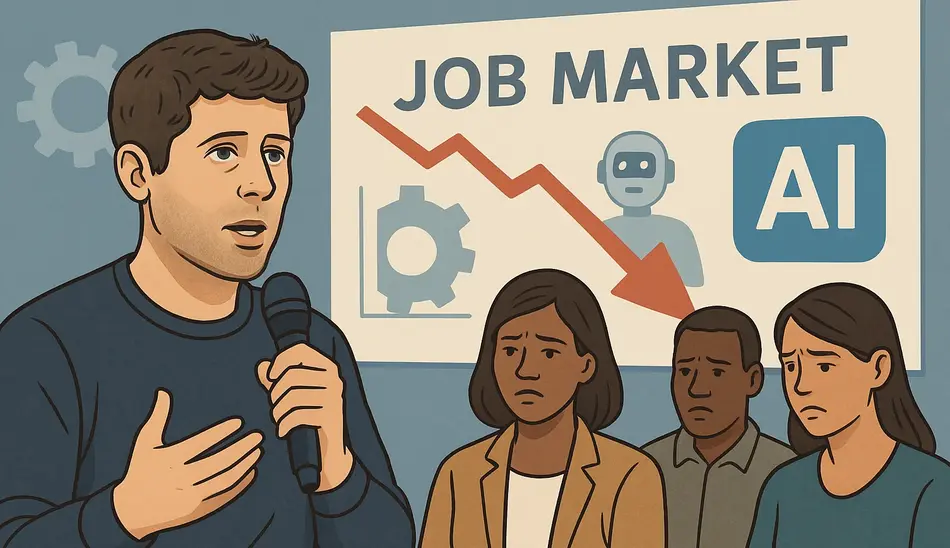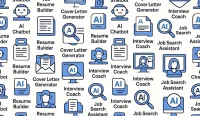In a dramatic turn of events that has sent shockwaves through the tech industry, OpenAI CEO Sam Altman has issued a stark warning about the future of employment in an AI-dominated world. Speaking at a US Federal Reserve conference in Washington DC, Altman’s comments have reignited the debate about artificial intelligence’s impact on jobs, careers, and the global economy.
The AI Revolution: From Science Fiction to Reality
Just five years ago, artificial intelligence was considered a distant future possibility—if it would happen at all. Even two and a half years ago, when ChatGPT launched on November 30th, 2022, AI was still largely confined to Silicon Valley’s tech circles. However, the pace of advancement has been nothing short of revolutionary.
Sam Altman’s AI job market warning comes at a critical juncture when AI technology has moved from theoretical discussions to practical applications that are already transforming industries worldwide. The OpenAI CEO’s predictions paint a picture of a future where AI will fundamentally reshape the employment landscape.
The Three Critical Predictions
Altman’s speech outlined three major predictions that every professional should understand:
- Certain job categories will vanish completely
- AI will affect almost all jobs
- AI is enabling bad actors and fraud
Prediction 1: Customer Service Jobs Face Extinction
According to Altman, customer service and call center positions are among the first casualties in the AI revolution. “Some jobs will cease to exist,” he stated, specifically pointing to traditional customer support roles.
The transformation is already visible. Just a few years ago, calling customer support meant navigating endless phone trees, speaking to multiple representatives, enduring hours on hold, and often not getting the desired resolution. Today, AI-powered customer support bots provide instant, intelligent assistance without transfers or waiting periods.
These AI systems can perform every function that human customer service agents traditionally handled, making them more efficient and cost-effective for companies. The implications for millions of workers in this sector are profound.
Prediction 2: Healthcare’s AI Transformation
Perhaps most controversially, Altman claims that ChatGPT is better at diagnosing diseases than most doctors. “ChatGPT today, most of the time, can give you better diagnosis than most doctors in the world,” he stated, referencing numerous stories where AI has identified rare conditions that human doctors missed.
However, here lies a fascinating paradox: despite acknowledging AI’s superior diagnostic capabilities, Altman admits he wouldn’t trust his own medical care to an AI system without human oversight. “I really do not want to entrust my medical fate to ChatGPT with no human doctor in the loop,” he confessed.
This contradiction highlights a critical issue in the AI revolution—the gap between AI’s capabilities and human trust in these systems. It’s like a chef who won’t eat his own cooking, raising questions about the real-world implementation of AI in critical sectors.
Prediction 3: The Rise of AI-Enabled Fraud
Altman’s third warning is perhaps the most concerning: AI is enabling bad actors and creating a fraud crisis. “The world is on the edge of a fraud crisis,” he declared, emphasizing that current voice-based fraud is just the beginning.
Soon, AI-generated video calls will be indistinguishable from reality, making traditional authentication methods obsolete. This creates unprecedented challenges for institutions and individuals trying to verify identities and prevent fraud.
The OpenAI CEO suggests that addressing AI-generated fraud requires new approaches to authentication and verification systems, potentially requiring partnerships between tech companies and regulatory bodies.
Hiring?
Post jobs for free with WhatJobs — and find professionals who understand the AI revolution. Whether you need AI-savvy developers, strategic thinkers, or creative talent, we connect you with future-ready candidates.
Post a Job Now →The Political Dimension: AI Regulation and Competition
Altman’s visit to Washington DC isn’t just about issuing warnings—it’s deeply political. America is preparing to release its AI action plan, and OpenAI wants to be at the center of the conversation.
Under the Biden administration, AI companies have pushed for regulation and guardrails. However, under a potential Trump administration, the approach shifts to “full speed ahead” with a focus on beating China and maintaining American AI dominance.
This political maneuvering reveals the complex dance between innovation, regulation, and national security interests in the AI space.
The Stargate Project: A $500 Billion Paradox
Ironically, while Altman warns about AI’s job-destroying potential, his own mega-project—Stargate—has struggled to create the jobs it promised. This $500 billion initiative, launched in partnership with SoftBank and Oracle, was supposed to create 10,000 jobs and turbocharge US innovation.
However, the project is currently stalled due to disagreements between partners about where to build facilities. What was promised as a massive job creation engine may only deliver a single data center this year.
This contradiction underscores the gap between AI’s promised potential and its current practical limitations.
What This Means for Your Career
Sam Altman’s AI job market warning should serve as a wake-up call for professionals across all industries. Here’s what you need to know:
Industries Most at Risk
- Customer Service and Support: Call centers, help desks, and basic support roles
- Data Entry and Processing: Routine administrative tasks
- Basic Content Creation: Simple writing, image generation, and design work
- Transportation: Autonomous vehicles threaten driving jobs
- Manufacturing: Automation continues to replace assembly line workers
Industries with AI Resistance
- Creative Leadership: Strategic thinking and innovation
- Human Services: Healthcare, education, and social work
- Complex Problem Solving: Research, analysis, and decision-making
- Relationship Management: Sales, consulting, and client services
- AI Development: Ironically, AI creates jobs in AI
How to Future-Proof Your Career
Develop AI-Resistant Skills
- Critical Thinking: Focus on analysis, evaluation, and complex reasoning
- Creativity: Develop unique perspectives and innovative solutions
- Emotional Intelligence: Build strong interpersonal and leadership skills
- Adaptability: Learn to work alongside AI tools effectively
- Specialized Knowledge: Deep expertise in specific domains
Embrace AI as a Tool
Rather than fearing AI, learn to leverage it:
- Use AI for routine tasks to focus on high-value work
- Develop AI literacy and understanding
- Stay updated on AI developments in your field
- Consider AI-related certifications and training
The Global Impact: Beyond Individual Careers
Altman’s warnings extend beyond individual job security to broader economic and social implications:
Economic Disruption
- Job Market Shifts: Rapid changes in demand for different skill sets
- Income Inequality: Potential widening gap between AI-savvy and traditional workers
- Geographic Changes: Concentration of AI jobs in tech hubs
- Industry Transformation: Complete restructuring of traditional sectors
Social Implications
- Education Reform: Need for new learning approaches and curricula
- Retraining Programs: Massive workforce development initiatives
- Social Safety Nets: Enhanced unemployment and retraining support
- Regulatory Frameworks: New laws and policies for AI governance
The Road Ahead: Balancing Innovation and Protection
Sam Altman’s dual role as both AI innovator and cautionary voice reflects the complex nature of this technological revolution. The challenge lies in harnessing AI’s benefits while mitigating its disruptive effects.
Key Considerations for Policymakers
- Education Reform: Preparing future generations for AI-integrated workplaces
- Worker Protection: Ensuring fair treatment during transitions
- Economic Policy: Managing the economic impacts of AI adoption
- International Cooperation: Coordinating AI development and regulation globally
Individual Action Steps
- Assess Your Role: Evaluate how AI might impact your current position
- Skill Development: Invest in AI-resistant and AI-complementary skills
- Network Building: Connect with professionals in emerging AI fields
- Continuous Learning: Stay informed about AI developments in your industry
- Adaptation Planning: Develop strategies for career evolution
Conclusion: Navigating the AI Revolution
Sam Altman’s AI job market warning serves as both a cautionary tale and a call to action. While AI will undoubtedly transform the employment landscape, the future isn’t predetermined. Success lies in understanding these changes, adapting proactively, and positioning yourself to thrive in an AI-enhanced world.
The key is not to fear AI but to understand how to work with it, around it, and through it. The most successful professionals will be those who can leverage AI tools while maintaining the uniquely human skills that machines cannot replicate.
Whether you’re a recent graduate, mid-career professional, or industry veteran, the time to prepare for the AI revolution is now. The choices you make today will determine your success in tomorrow’s AI-driven economy.
FAQ Section
What is Sam Altman’s AI job market warning about?
Sam Altman’s AI job market warning predicts that artificial intelligence will eliminate certain job categories entirely, affect almost all professions, and create new challenges with AI-enabled fraud. He specifically identifies customer service, healthcare diagnostics, and traditional support roles as areas facing immediate disruption.
Which jobs are most at risk from AI according to Altman?
According to Sam Altman’s AI job market warning, the most vulnerable positions include customer service and call center roles, basic data entry and processing jobs, routine content creation, transportation jobs threatened by autonomous vehicles, and manufacturing positions being replaced by automation.
How can I protect my career from AI disruption?
To protect your career from AI disruption, focus on developing AI-resistant skills like critical thinking, creativity, emotional intelligence, and specialized knowledge. Learn to work alongside AI tools effectively, stay updated on industry developments, and consider roles that require uniquely human capabilities that machines cannot replicate.
What industries are safest from AI job market disruption?
Industries most resistant to AI job market disruption include creative leadership roles, human services like healthcare and education, complex problem-solving positions, relationship management in sales and consulting, and ironically, AI development itself. These roles require skills that are difficult for AI to replicate.




